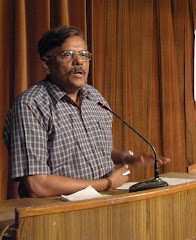Fahmida Riyaz
BOOK REVIEW Ghar by Vibhuti Narain Rai (Hindi novel to be published in Urdu in Pakistan).
I was twenty, I won’t let anyone say those are the best years of your life. —Paul Nizan in Eden Arabie
Reading Ghar, the first novel by Vibhuti Narain Rai, first published in 1983, my mind was reflecting on several questions. As I turned the leaves of this heart-wrenching and captivating account of a household, an aged pensioner and his three youthful progenies, in Eastern Uttar Pardesh in independent India in the indecisive decade of the seventies, like the standing opaque water in a pool that gives little clue of what it may be nurturing in its depths, I was thinking about the difference between the development of the genre of novel in Hindi and in Urdu, its sister language, separated from it by wars and two different scripts, regretting the loss it has caused to Urdu literature. I remembered the few Hindi novels I had the chance to read earlier, Maila Anchal by Phaneshwar Nath Renu, Rag Darbari by Shrilal Shukla and Kolkatta Bypass by Alka Sarogi, and contemplated that such novels have not been written in Urdu after independence. I was also marvelling at the impact of the evocative, brief sentences in Ghar, describing locale and recording the seemingly rambling observations of the author, a yawn, a tattered piece of newspaper that has changed hands the whole day in a tea shop, a cup of tea gone cold, adroitly exposing the inner depths, the desperate struggle in the souls of the characters wherein lies the real story of Ghar. But, above all, I continuously thought about La Conspiration, by the legendry French author Paul Nizan, not for similarities, but the amazing contrast between the two literary offerings. La Conspiration (The Conspiracy in English translation) was published between the two World Wars, in 1938, with the famous Foreword by Jean Paul Sartre, Nizan’s long-time friend since they were schoolmates in a Parisian Lycee, Lois-le-Grand. Paul-Yves Nizan (born 1905) was a member of the French Communist Party (Vibhuti has always proclaimed to be a Marxist), though he had resigned from the Party after hearing of the Molotov-Ribbentrop pact in 1939. Nizan was killed in the Second World War in 1940, fighting against the German Army in the Battle of Dunkirk. He wrote The Conspiracy focusing a five young Parisians, with the vigour and fresh receptivity of a 33-year-old European, round about the same age at which V.N. Rai, a sensitive and insightful citizen of a post-colonial India, wrote Ghar. Both the novels are about young people. That is where the similarities end. In Ghar, you enter the world of Vibhuti, standing so distinctly apart! The inner landscape of the heart and mind, the concerns, the choice of young characters, tell you a different story. La Conspiration is about the lives of revolutionary bourgeois youth, whereas Vibhuti is writing about the crumbling lives of the white-collared poverty-stricken young people in the qasbati India. It is the painful story of an impoverished white-collared family teetering on the brink of destitution, hanging on to appearances with the skin of its teeth through the tenuous threads of pretences and transparent deceptions, a story of the humiliation, indignity, betrayal, heart-break and the ominously brewing violence inherent in the struggle of this family to restore itself to the status of the middle class from which it has been ousted by deteriorating economic conditions. It is difficult to describe what the story of Ghar focuses upon. It is a slice of life in qasbati India of the decade of the seventies, a largish village, complete with the shop of a Bania, the rich grocer Shankar, who lets the poverty stricken neighbours buy grocery on credit to exploit them to the hilt, where unemployed youth and criminals roam the streets, where lives Munshi sahib, with an unmarried young daughter Rajkumari, an unemployed, college-educated son, Vinod and a younger son Puppo, who has gone wayward, who plays truant with his school and steals money from his own home. With small detals, the young V.N. Rai recreated it all; The two-roomed house where Munshi sahib lives with three young progenies, where everyone knows everything about one another but must pretend that they have not noticed. The pain of Pappo’s years of adolescence, where time and again he is caught red- handed in the unmentionable act of self-pleasure, the compulsion to send Rajkumari to the grocer because Shankar would not allow credit to any of his boys, knowing full well that in that shop Rajkumari has to constantly defend herself against the lecherous advances of Shankar. This house of smouldering shame is also a house of dreams. As night falls, its four occupants dream of a better future. Rajkumari dreaming of a Rajkumar, who will come and take her far, far away, Vinod, the elder son, a sensitive and romantic young man dreaming of getting a job suitable for his capability and getting married to the girl next door with whom he is having a budding romantic relationship, a shameful taboo in the village ambience, and Puppo, the adolescent, his burning sense of impotence making him dream of armed robbery in Shanker’s shop, his youthful face growing more and more tense as the dream proceeds, of watching the heartless plunderer of the neighbourhood, trembling fearfully and pleading for mercy. The favourite part of Puppo’s dream is when, having snatched a fat wad of currency notes from Shankar, just as he is leaving the shop, he would remove his mask to let Shankar see his face and recognise the brother of the hapless girl whom he tried to disgrace every day in this very shop. The awning over these young dreams is the dream of Munshiji, also lying awake for hours, just pretending to be asleep like the rest of the members of his family, each one fully aware of each other’s faking slumber. Munshiji, smouldering with shame, watching his patriarchal role crumble as he sees his power to provide for the family disintegrating, dreaming of a job for Vinod, of arrangement of dowry for his daughter, the dowry that a daughter-in-law could bring in, making possible a befitting wedding for Rajkumari, the sources he could manipulate still, the distaste of giving two rupees worth of bribe to the clerk who distributed the pension money, two rupees out of hundred rupees of his pension, the endless calculation of the bills, the rent, the milkman, the newspaper, an English newspaper! Giving the family a higher class status in the neighbourhood! Heart-wrenching are also the desperate attempts of the characters caught in the web of circumstances to draw or cross some lines to cling to self-respect, hard choices between compelling needs and respectability, Rajkumari in her twentyeighth year succumbing to try to draw some sexual satisfaction from a mere child entering his teens, his inexperience and childish, weak physique making him fail helplessly, of Puppo, getting trapped in the clutches of the village ruffian, on the promise of showing him and letting him touch a real pistol, agreeing to be physically abused by him but insisting that he will not be shared by the friends of the ruffian, yet the ruffian sharing him with his friends, again and again. And Munshiji, lying to his walking companions in the park about the fiancé of his daughter who would come for the wedding when he would get leave from his strict employers, coming home and hitting Rajkumari, then lie down, covering his face and choke over his sobs. A certain club or organisation in the qasbah is also mentioned in Ghar, that trains the bitter and seething adolescents of the dispossessed classes to build their muscles and increase physical strength. The boys in the school show their arms muscles to each other and ridicule those among them who are physically weaker. The author does not give this organisation a name, yet the reader senses the potentials of militancy, being carefully nurtured for the future when it could be given a religious signboard. Quoting Nizan, Sartre writes about the youth in The Conspiracy: “Propelled to act by bad conscience, they are that essence in motion, which is youth, a sham age, a fetish...Their fatal light-mindedness and aggressive futility are due to the fact that they have no duties.” “(for them ) youth is the age of resentment, not of the great anger of men who suffer....what they want above all is to give their parents a bit of trouble.” And on the suicide of Bernard Rosenthal, one of the young characters of Nizan’s novel, Sartre comments: “The agony of death alone will show him—that he has missed love.” In V.N. Rai’s Ghar, the “home”, which could be the home of several strata of the white- collared middle classes, so idolised by the subcontinental traditionalists, is a hell-hole where the family members have to pretend to be blind and deaf and remain tongue-tied towards one another. The youth is suffocated, dreaming of escape from their home. But they are tied to it and to each other, by the most unlikely bond in this situation, a bond of love and respect, and a deeply rooted sense of responsibility towards one another. Vinod fantasises about leaving the house, that “like an octopus wrapped its hundreds of legs around him, sucking his blood “, but he will not follow this fantasy, because it could mean the corpse of a pregnant Rajkumari in the depths of a well, of Puppo ending up in a jail, of Munshiji humiliated on the streets by his creditors. And Rajkumari will go on putting aside some food for Puppo who will always come too late to eat. She will keep getting up past midnight, sharing her quilt with her adolescent brother, saving him from the severe cold of the freezing December in the plains of eastern Uttar Pardesh, there being no extra quilt in the house for him, and Puppo would quietly steal out of his bed, preferring to shiver through the night rather than begin to fantasise about the womanly body of his sister sharing his bed. Marxist social scientists have been pointing out since the Second World War that the dispossessed strata of the middle classes are the bedrock for aggressive, blood thirsty despotism. Ghar reveals the why and how of this deduction. But it also identifies certain possibilities through the struggle in the suffering of its characters that may yet save India from the silently creeping clutches of the final triumph of fascism. Jean Paul Sartre, in his charming outpouring of philosophical abundance, remarks in the Foreword of The Conspiracy: “Can a Communist write a novel?”, then answers the question: “I am not convinced of it. He does not have the right to make himself the accomplice of his characters.” But Sartre was writing about a different world. A good deal of life was elsewhere. The colonisers left behind them a ruin and a roadmap to a treasure in India. The Indian novelist seems to handle and tackle both confidently and in his own way. I am not sure if Vibhutiji even consciously used a “technique” in this first novel of his, except writing about what really happens in real life. Reading Ghar, all that this reader felt was the thoughtful but compelling thrust of the narrative, and that, I think, was enough to make it an intense, personal, emotional and intellectual experience for me. The author, a noted Pakistani poetess, was recently in India.


























